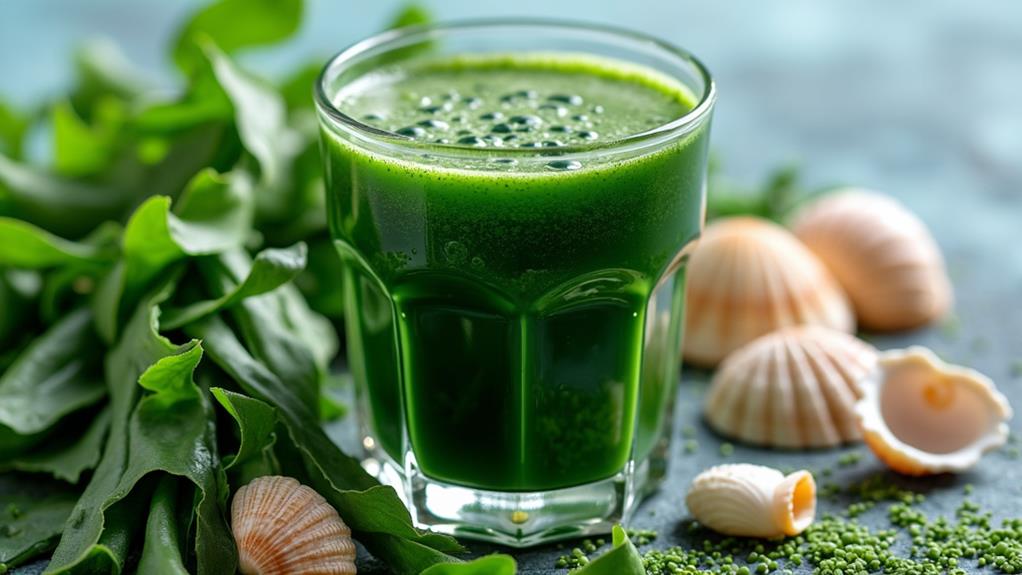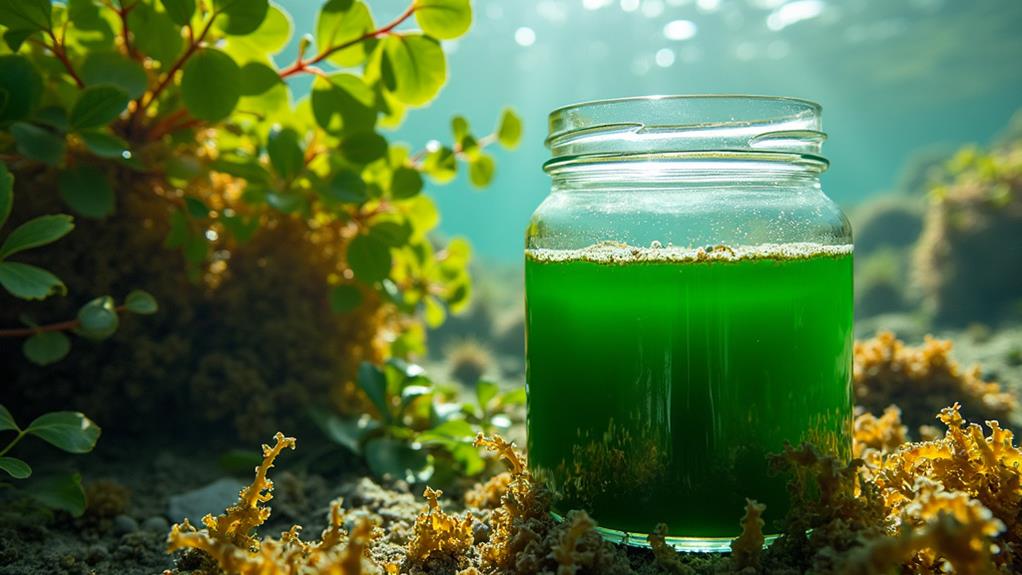Seaweed Juice: Iodine-Rich Drink for Thyroid Support

Consider adding seaweed juice to your diet for improved thyroid support, as it's rich in iodine vital for hormone production. Seaweed absorbs iodine from seawater, with varieties like kombu and wakame offering higher concentrations. Just a small serving surpasses the recommended daily iodine intake, making it effective in preventing issues like goiter and cognitive impairments. While it's beneficial, moderation is important to avoid excessive iodine, which can lead to thyroid disorders. Pregnant women and children should limit intake to one weekly serving. Investigate more to uncover how this nutrient-rich juice supports a healthy lifestyle and thyroid function.
Importance of Iodine for Thyroid
In regard to maintaining a healthy thyroid, iodine plays a central role. It's essential for the production of thyroid hormones T4 and T3, which regulate your metabolic activity. These hormones are critical for growth and development, particularly during pregnancy and infancy. Making sure you get an adequate daily intake of dietary iodine is necessary for your thyroid health. The World Health Organization recommends a daily iodine intake of 150 µg for most people, but if you're pregnant, that increases to 250 µg to support fetal development and prevent iodine deficiency.
Iodine deficiency can lead to serious issues like goiter, hypothyroidism, and cognitive impairments, especially affecting children and pregnant women. To avoid these problems, incorporating iodine-rich foods into your diet is key. Seaweed is one of the richest natural sources of iodine, making it an excellent option to support your thyroid health and meet your daily intake needs. However, it's significant to regularly monitor your iodine levels, as both deficiency and excess can disrupt thyroid function. By being mindful of your iodine intake, you can help guarantee your thyroid remains healthy and functions at its best.
Seaweed as an Iodine Source
Because seaweed can absorb and concentrate iodine from seawater, it stands out as one of the most potent natural sources of this important mineral. If you're looking to support your thyroid health, seaweed is an excellent option to take into account. Brown seaweeds, like kombu and wakame, are particularly rich in iodine content, often boasting levels markedly higher than green or red varieties. This makes them a fantastic iodine source, ensuring you meet your dietary needs with ease.
A small serving of dried brown seaweed can easily surpass the recommended daily intake of 150 µg of iodine. This is significant because maintaining adequate iodine intake is critical for thyroid health and preventing iodine deficiency. Ensuring your complete iodine intake meets these requirements can help you avoid potential health issues linked to insufficient levels.
Regularly incorporating seaweed into your diet is an effective way to enhance your iodine intake naturally. However, it's important to take into account the iodine content of different seaweed types to fulfill your dietary needs properly. Seaweed not only helps in meeting your iodine requirements but also supports your thyroid health, making it a valuable supplement to your nutrition plan.
Variability in Seaweed Iodine Levels

While seaweed is renowned for its impressive iodine content, not all seaweed is created equal regarding iodine levels. Brown seaweed usually boasts higher iodine concentrations than green or red varieties. For example, dried kombu kelp can contain around 2,984 µg of iodine per gram, whereas nori typically ranges from 16 to 43 µg per gram. This significant seaweed iodine content difference means that when you're considering seaweed for thyroid support, understanding iodine variability is essential.
Several factors contribute to this variability. Seaweeds can absorb iodine from seawater at levels up to 30,000 times the iodine concentration found in seawater. However, iodine levels can fluctuate based on the seaweed's growth stage, seasonal changes, and environmental conditions. Even the specific part of the seaweed consumed can impact the iodine content. Processing methods like washing and drying also play a role, often reducing the iodine levels in the final product.
When choosing an iodine-rich drink derived from seaweed, you should be mindful of these variables. Selecting seaweed with consistently high iodine levels is vital if you're aiming for the best thyroid support.
Health Benefits of Seaweed Juice
Imagine improving your thyroid health with a glass of seaweed juice. This iodine-rich drink plays a vital role in supporting thyroid function by aiding the production of hormones like thyroxine (T4) and triiodothyronine (T3), which are fundamental for regulating your metabolism. Just a small serving of seaweed juice, especially from varieties like kombu, contains an impressive amount of iodine, far exceeding the daily requirement of 150 µg for adults. This high iodine content helps prevent iodine deficiency, which can lead to issues like goiter and cognitive impairments.
Incorporating seaweed juice into your diet comes with numerous health benefits beyond just supporting your thyroid. It's packed with vitamins and antioxidants, providing a nutritional enhancement that can improve your general wellbeing. This makes seaweed juice an excellent choice for those on vegan diets or living in areas where iodine-rich foods are scarce. By increasing your iodine intake through this natural source, you can maintain healthy thyroid function and support your body's metabolic processes. So, consider making seaweed juice a regular part of your routine and experience the thorough health benefits it offers.
Safe Consumption Guidelines
Moderation is key when incorporating seaweed juice into your diet. This iodine-rich drink offers thyroid support, but you have to be mindful of your iodine intake. Balancing your consumption guidelines is crucial to avoid excess iodine, which can lead to thyroid disorders. Consider these points:
- Pregnant women and children: Limit brown seaweed to one serving per week to prevent excessive iodine.
- Iodine intake assessment: Regularly monitor your iodine status. Excess iodine can pose risks, so maintain a balanced diet that includes a variety of iodine-rich foods.
- Upper limit: The European Food Safety Authority (EFSA) recommends a daily upper limit of 600 µg of iodine. Keep this in mind when consuming seaweed juice.
- Consult healthcare professionals: If you have existing thyroid conditions, seek advice before adding seaweed juice or other iodine-rich foods to your diet.
Incorporating seaweed juice thoughtfully helps prevent iodine deficiency while supporting your thyroid health. By following these consumption guidelines, you can enjoy the benefits without risking excess iodine intake. Always consult healthcare professionals if you're unsure about how seaweed juice fits into your dietary plan, especially during pregnancy or with thyroid concerns.
Potential Risks of Excess Iodine
Balancing your iodine intake is fundamental, but it's likewise significant to be aware of the potential risks of consuming too much iodine. Excessive iodine intake can lead to thyroid disorders, including goitre, hypothyroidism, and hyperthyroidism. Chronic lymphocytic thyroiditis has been linked to excessive seaweed consumption, especially from high-iodine brown varieties. The European Food Safety Authority (EFSA) recommends an upper intake level of 600 µg per day. It's important to monitor your diet, as this limit can be easily exceeded with certain seaweeds.
If you're pregnant or have young children, be particularly cautious. Pregnant women should limit high-iodine seaweed to one serving per week to avoid thyroid-related health issues. Regular monitoring of your iodine status is significant since increased levels can heighten the risk of thyroid disease.
Watch for symptoms of excessive iodine, such as nausea, vomiting, diarrhea, and a metallic taste in your mouth. These signs indicate that you might need to adjust your iodine intake. While seaweed juice can support thyroid health, maintaining a balanced approach is key to preventing adverse health effects from excessive iodine.
Iodine Absorption and Bioavailability

When you consume iodine-rich foods like seaweed, your body absorbs iodine primarily through the gut, aided by the sodium iodide symporter. This process greatly improves the bioavailability of iodine from diverse dietary sources. Seaweed, especially brown varieties, is an excellent source due to its ability to concentrate iodine up to 30,000 times that of seawater. However, the iodine content in seaweed can vary widely depending on the species and environmental conditions, which influence its bioavailability in your diet.
To maintain ideal thyroid support, it is important to monitor your iodine intake. The World Health Organization sets recommended median urinary iodine values to assess if your intake is adequate. Factors such as food processing and other dietary components can impact iodine absorption. If you're iodine deficient, consuming seaweed might help, but it is vital to take these factors into account for effective intake.
Here are key points to remember:
- Iodine Absorption: Facilitated by the sodium iodide symporter in your gut.
- Bioavailability: Influenced by seaweed species and environmental conditions.
- Urinary Iodine: A key indicator of your iodine status.
- Recommended Intake: Follow WHO guidelines to avoid deficiency.
Future Research Directions
Exploring the depths of seaweed juice's potential, future research should focus on its role as a concentrated iodine source and its impact on thyroid health and metabolism. You'll want to investigate how iodine intake from seaweed juice might influence thyroid function, especially in populations with high seaweed consumption. Understanding this relationship could reveal vital insights into preventing thyroid disorders. It's significant to look at how seaweed cultivation affects iodine levels in seawater and consequently, iodine bioavailability in human diets.
Along with iodine's role, research should also identify other bioactive compounds in seaweed juice, such as antioxidants, and evaluate their potential health benefits. These compounds might play a noteworthy role in preventing chronic diseases, including metabolic disorders and cancer. Consumer preferences are another key aspect to reflect upon. How does seaweed juice measure up against traditional iodine sources regarding taste, convenience, and nutrient absorption? Future research can help determine if this iodine-rich drink truly appeals to consumers as a dietary supplement.




